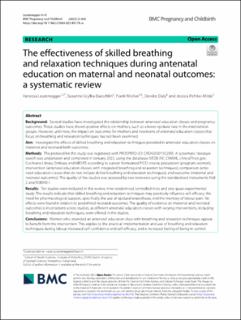Please use this identifier to cite or link to this item:
https://doi.org/10.21256/zhaw-26646| Publication type: | Article in scientific journal |
| Type of review: | Peer review (publication) |
| Title: | The effectiveness of skilled breathing and relaxation techniques during antenatal education on maternal and neonatal outcomes : a systematic review |
| Authors: | Leutenegger, Vanessa Grylka-Baeschlin, Susanne Wieber, Frank Daly, Deirdre Pehlke-Milde, Jessica |
| et. al: | No |
| DOI: | 10.1186/s12884-022-05178-w 10.21256/zhaw-26646 |
| Published in: | BMC Pregnancy & Childbirth |
| Volume(Issue): | 22 |
| Issue: | 1 |
| Page(s): | 856 |
| Issue Date: | 19-Nov-2022 |
| Publisher / Ed. Institution: | BioMed Central |
| ISSN: | 1471-2393 |
| Language: | English |
| Subjects: | Antenatal class; Breathing exercise; Childbirth preparation; Maternal; Neonatal and birth outcome; Female; Pregnancy; Infant, newborn; Human; Relaxation therapy; Mother; Randomized controlled trial as topic; Prenatal education; Labor, obstetric; Labor pain |
| Subject (DDC): | 618.4: Childbirth |
| Abstract: | Background: Several studies have investigated the relationship between antenatal education classes and pregnancy outcomes. These studies have shown positive effects on mothers, such as a lower epidural rate in the intervention groups. However, until now, the impact on outcomes for mothers and newborns of antenatal education classes that focus on breathing and relaxation techniques has not been examined. Aim: Investigate the effects of skilled breathing and relaxation techniques provided in antenatal education classes on maternal and neonatal birth outcomes. Methods: The protocol for this study was registered with PROSPERO (ID: CRD42020192289). A systematic literature search was undertaken and completed in January 2022, using the databases MEDLINE, CINAHL, clinicalTrials.gov, Cochrane Library, Embase and MIDIRS according to a priori formulated PICO criteria: population (pregnant women), intervention (antenatal education classes with integrated breathing and relaxation techniques), comparison (antenatal education classes that do not include skilled breathing and relaxation techniques), and outcome (maternal and neonatal outcomes). The quality of the studies was assessed by two reviewers using the standardised instruments RoB 2 and ROBINS-I. Results: Ten studies were included in this review, nine randomised controlled trials and one quasi-experimental study. The results indicate that skilled breathing and relaxation techniques may positively influence self-efficacy, the need for pharmacological support, specifically the use of epidural anaesthesia, and the memory of labour pain. No effects were found in relation to predefined neonatal outcomes. The quality of evidence on maternal and neonatal outcomes is inconsistent across studies, as different antenatal education classes with varying interventions, including breathing and relaxation techniques, were offered in the studies. Conclusions: Women who attended an antenatal education class with breathing and relaxation techniques appear to benefit from the intervention. This applies to the practical implementation and use of breathing and relaxation techniques during labour, increased self-confidence and self-efficacy, and a increased feeling of being in control during labour. This demonstrates the importance of information provision and a focus on breathing and relaxation techniques in antenatal education. |
| URI: | https://digitalcollection.zhaw.ch/handle/11475/26646 |
| Fulltext version: | Published version |
| License (according to publishing contract): | CC BY 4.0: Attribution 4.0 International |
| Departement: | School of Health Sciences |
| Organisational Unit: | Institute of Midwifery and Reproductive Health (IHG) Institute of Public Health (IPH) |
| Appears in collections: | Publikationen Gesundheit |
Files in This Item:
| File | Description | Size | Format | |
|---|---|---|---|---|
| 2022_Effectiveness-of-skilled-breathing-and-relaxation-techniques_BMC-Pregnany-Childbirth.pdf | 2.17 MB | Adobe PDF |  View/Open |
Show full item record
Leutenegger, V., Grylka-Baeschlin, S., Wieber, F., Daly, D., & Pehlke-Milde, J. (2022). The effectiveness of skilled breathing and relaxation techniques during antenatal education on maternal and neonatal outcomes : a systematic review. BMC Pregnancy & Childbirth, 22(1), 856. https://doi.org/10.1186/s12884-022-05178-w
Leutenegger, V. et al. (2022) ‘The effectiveness of skilled breathing and relaxation techniques during antenatal education on maternal and neonatal outcomes : a systematic review’, BMC Pregnancy & Childbirth, 22(1), p. 856. Available at: https://doi.org/10.1186/s12884-022-05178-w.
V. Leutenegger, S. Grylka-Baeschlin, F. Wieber, D. Daly, and J. Pehlke-Milde, “The effectiveness of skilled breathing and relaxation techniques during antenatal education on maternal and neonatal outcomes : a systematic review,” BMC Pregnancy & Childbirth, vol. 22, no. 1, p. 856, Nov. 2022, doi: 10.1186/s12884-022-05178-w.
LEUTENEGGER, Vanessa, Susanne GRYLKA-BAESCHLIN, Frank WIEBER, Deirdre DALY und Jessica PEHLKE-MILDE, 2022. The effectiveness of skilled breathing and relaxation techniques during antenatal education on maternal and neonatal outcomes : a systematic review. BMC Pregnancy & Childbirth. 19 November 2022. Bd. 22, Nr. 1, S. 856. DOI 10.1186/s12884-022-05178-w
Leutenegger, Vanessa, Susanne Grylka-Baeschlin, Frank Wieber, Deirdre Daly, and Jessica Pehlke-Milde. 2022. “The Effectiveness of Skilled Breathing and Relaxation Techniques during Antenatal Education on Maternal and Neonatal Outcomes : A Systematic Review.” BMC Pregnancy & Childbirth 22 (1): 856. https://doi.org/10.1186/s12884-022-05178-w.
Leutenegger, Vanessa, et al. “The Effectiveness of Skilled Breathing and Relaxation Techniques during Antenatal Education on Maternal and Neonatal Outcomes : A Systematic Review.” BMC Pregnancy & Childbirth, vol. 22, no. 1, Nov. 2022, p. 856, https://doi.org/10.1186/s12884-022-05178-w.
Items in DSpace are protected by copyright, with all rights reserved, unless otherwise indicated.